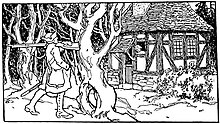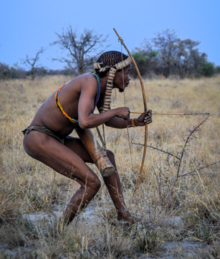Hunter
A hunter is a person who goes on the hunt , that is, seeks out game , chases it, catches it, kills it and appropriates it.
term
Definition of terms
In addition to the commonly used standard term hunter, there are various other terms, such as the traditional hunter- language term Weidmann or Waidmann , the joking terms Grünrock (in relation to the hunters as a whole: green guild ) and Nimrod as well as the colloquially outdated term hunter man .
Word origin and spelling of weid or waid
Hunting composites with weid (z. B. Weidmann, venison , Weidgerechtigkeit ) can be attributed to the Indo-European root uid * "procure food" attributed to the importance that in the course of language development to althochdeutsch weida, medium- later and High German weid was, from which the term pastureland also emerged . The ei spelling can thus be regarded as the older one from an etymological point of view, as it is the original one and makes clear the relation of the word weid to the acquisition of food.
The newer ai spelling (e.g. Waidmann, Waidwerk, Waiderechtigkeit) spread particularly through its use in the Reichsjagdgesetz (Reichsjagdgesetz) passed in 1934, where the new spelling was supposed to symbolize the new beginning associated with the introduction of the law, and is enjoyed in Germany, especially in official ones Announcements of the German Hunting Association (DJV), a certain popularity even today. The Federal Hunting Act , with Section 1 (3) (“the generally recognized principles of German grazing justice”), as well as the hunting laws of the Austrian federal states and German-speaking cantons of Switzerland, use the old ei spelling , which is more common according to Duden .
Country Statistics
In some of the countries listed, not every type of hunting practice or every hunter generally needs a state license or the applicable regulations are ignored ( poaching ), so the data sets on the number of hunters are partly extrapolations based on representative surveys, for example in the case of Canada and the United States.
table
| Country | Hunter | Residents
in millions |
Share of hunters in the
Total population in% |
relationship
Hunter / Resident |
Area in km² | Hunters per km² of land area |
|---|---|---|---|---|---|---|
|
|
2,482,678 | 34.7 | 7.15 | 1:14 | 9,984,670 | 0.25 |
|
|
308,000 | 5.2 | 5.92 | 1:17 | 338,448 | 0.91 |
|
|
45,000 | 0.8 | 5.63 | 1:18 | 5,896 | 7.63 |
|
|
190,000 | 4.7 | 4.04 | 1:25 | 385.207 | 0.49 |
|
|
15,000 | 0.4 | 3.75 | 1:27 | 316 | 47.47 |
|
|
11,453,000 | 323.1 | 3.54 | 1:28 | 9,826,675 | 1.17 |
|
|
290,000 | 9.0 | 3.22 | 1:31 | 447,435 | 0.65 |
|
|
165,000 | 5.5 | 3.00 | 1:33 | 42,921 | 3.84 |
|
|
104,000 | 4.2 | 2.48 | 1:46 | 70.273 | 1.48 |
|
|
235,000 | 10.7 | 2.20 | 1:46 | 131,957 | 1.78 |
|
|
980,000 | 45.0 | 2.18 | 1:46 | 505.970 | 1.94 |
|
|
230,000 | 10.7 | 2.15 | 1:47 | 92,212 | 2.49 |
|
|
1,331,000 | 64.1 | 2.08 | 1:48 | 543.965 | 2.45 |
|
|
2,800,000 | 143.2 | 1.96 | 1:51 | 17.125.200 | 0.16 |
|
|
110,000 | 7.7 | 1.43 | 1:70 | 110.994 | 0.99 |
|
|
118,000 | 8.3 | 1.42 | 1:70 | 83,879 | 1.41 |
|
|
800,000 | 61.1 | 1.31 | 1:76 | 242,495 | 3.30 |
|
|
750,000 | 58.1 | 1.29 | 1:77 | 301,338 | 2.49 |
|
|
16,600 | 1.3 | 1.28 | 1:78 | 45,339 | 0.37 |
|
|
55,000 | 4.5 | 1.22 | 1:82 | 56,594 | 0.97 |
|
|
22,000 | 2.0 | 1.10 | 1:91 | 20,273 | 1.09 |
|
|
25,000 | 2.3 | 1.09 | 1:92 | 64,589 | 0.39 |
|
|
110,000 | 10.2 | 1.08 | 1:93 | 78,866 | 1.39 |
|
|
55,000 | 5.4 | 1.02 | 1:98 | 49.034 | 1.12 |
|
|
32,000 | 3.6 | 0.89 | 1: 113 | 65,300 | 0.49 |
|
|
55,000 | 9.9 | 0.56 | 1: 180 | 93,036 | 0.59 |
|
|
351,000 | 82.5 | 0.43 | 1: 235 | 357,578 | 0.98 |
|
|
2,000 | 0.5 | 0.40 | 1: 250 | 2,586 | 0.77 |
|
|
30,000 | 7.6 | 0.39 | 1: 253 | 41,285 | 0.73 |
|
|
106,000 | 38.5 | 0.28 | 1: 363 | 312,696 | 0.34 |
|
|
60,000 | 22.2 | 0.27 | 1: 370 | 238.391 | 0.25 |
|
|
23,000 | 10.4 | 0.22 | 1: 452 | 30,688 | 0.75 |
|
|
28,170 | 16.7 | 0.17 | 1: 593 | 41,543 | 0.68 |
diagram
Type of service hunter in the military
In the context of the military, Jäger in German-speaking armed forces, as well as its counterparts in some other languages, stands for a " rifle- armed group of infantry primarily intended for use in scattered combat ". Hunters as a branch of the army were first set up in 1631 in the Landgraviate of Hessen-Kassel and later also in other German armies from trained professional hunters and foresters . The hunters, who already acted independently in the hunting and forestry professional life, were able to operate independently and without direct contact with the management as part of an order tactic. Recruits, often from relevant families, were usually given jobs in forestry after their service time. Due to their job, they had better shooting skills and also more pronounced skills for orientation and for using the terrain, which was an advantage in rifle combat as well as outpost and reconnaissance service .
Fairy tales and stories

Like few other professional groups, the hunters have been mystified in numerous fairy tales and stories. In the north and central German fairy tales and stories, they appear primarily as noble characters. Often it is they who in fairy tales bring about or seal the change for the better at the end (for example, rescue from the “bad wolf ”).
In the homeland films of the 1950s, too , hunters often appear as noble cavaliers and thus function in a certain way as successors to knights from medieval sagas and stories. In contrast, the hunters or “hunters” are often portrayed negatively in southern German, especially Bavarian, folk tales . This is especially true for songs and stories that reflect feudal or absolutist conditions. There, the conflict between the “game shooters” ( poachers ) as identifying figures from the people and the hunters as assistants to the authorities is described. The people felt that the forest belonged to everyone; Poaching was therefore considered legitimate, but was severely persecuted by the sovereigns, who claimed hunting as a sovereign privilege. While the game shooters are portrayed as brave and caring men who share their prey with the poor, the hunters are described as cowardly, insidious and cruel. This is particularly evident in the Bavarian song by the shooter Georg Jennerwein , but the Erzgebirge poacher Karl Stülpner has also become a legend in a similar way .
However, other stories also report from a different point of view and portray the poachers as criminal and dangerous lawbreakers who spread fear and terror with their weapons and can be compared with robbers , for example the story of the Krambambuli by the well-known author Marie von Ebner-Eschenbach .
The hunter's robe is also a frequent disguise of the devil , for example in Jeremias Gotthelf's novella “ The Black Spider ”. In many versions of the legend of the Pied Piper of Hamelin , the latter kidnaps children in hunter's dress.
See also
literature
- Ilse Haseder , Gerhard Stinglwagner : Knaur's large hunting dictionary. Weltbild-Verlag, Augsburg 2000, ISBN 3-8289-1579-5
- Lutz Röhrich : Hunting, hunting, hunter. In: Rolf Wilhelm Brednich u. a. (Ed.): Encyclopedia of fairy tales. Concise dictionary for historical and comparative narrative research. Volume 7 (Ibn al-Ǧauzī - Little People). De Gruyter, Berlin and New York 1993, ISBN 3-11-013478-0 , Sp. 394-411.
Web links
Individual evidence
- ↑ Hunter. In: Duden. Retrieved October 15, 2019 .
- ^ Lutz Mackensen: Origin of words: The etymological dictionary of the German language . 1st edition. Bassermann, Munich 2014, ISBN 978-3-641-64140-5 , p. 439 ( google.de [accessed January 17, 2019]).
- ↑ Elmar Seebold: Etymological dictionary of the German language . Friedrich Kluge. 22nd edition. Walter de Gruyter, Berlin 1989, ISBN 3-11-006800-1 , p. 783 ( google.de [accessed January 17, 2019]).
- ↑ a b c Sigrid Schwenk: Terms from the hunter's language: Pasture justice . In: Hunting in Bavaria . No. 12 , 2007, p. 23 ( jagd-bayern.de [PDF; 441 kB ; accessed on January 15, 2019]).
- ↑ Weideland, das. In: Duden. Retrieved January 17, 2019 .
- ↑ Willow, the. In: Duden. Retrieved January 17, 2019 .
- ^ Georg Ludwig Hartig: Lexicon for hunters and hunting enthusiasts or hunted conversation lexicon . Ed .: Theodor Hartig. 2nd, often increased and improved edition. Nicolai, Berlin 1861, p. 591 ( scan in Google Book Search [accessed January 14, 2019]).
- ^ A b Klaus Schriewer: Nature and Consciousness: A Contribution to the Cultural History of the Forest in Germany . Waxmann, Münster 2015, ISBN 978-3-8309-8292-0 , pp. 129 .
- ^ Helmut Goeser: History of the Federal Hunting Act . Reg.-No .: WF VG 192/03. Ed .: Scientific Services of the German Bundestag. Berlin October 1, 2004, p. 3 ( bundestag.de [PDF; accessed on January 14, 2019]).
- ^ Mathilde Hennig (Ed.): Duden - The dictionary of linguistic doubtful cases: Correct and good German (= Duden Library . Volume 9 ). 8th edition. Dudenverlag, 2016, ISBN 978-3-411-91239-1 , p. 1014 : "The noun, like the corresponding compound words (Weidmannsheil, Weidwerk, Weidsack, Weidspruch etc.) is generally written with ei."
- ↑ Pasture justice, especially technical language, pasture justice, the. In: Duden. Retrieved January 17, 2019 .
- ↑ Hunters in Europe 2017. (PDF) In: Deutscher Jagdverband. January 2018, accessed August 29, 2019 .
- ^ David Scallan: The Place of Hunting in Rural Ireland . National University of Ireland, Galway March 20, 2012, p. 95 ( archive.org [PDF; accessed January 25, 2020]).
- ↑ Federal, Provincial, and Territorial Governments of Canada (Ed.): 2012 Canadian Nature Survey: Awareness, participation and expenditures in nature-based recreation, conservation, and subsistence activities . Ottawa, ON, Canada 2014, ISBN 978-1-100-23241-6 , pp. 52 (English, archive.org [PDF; accessed on August 29, 2019]).
- ↑ Kathleen Braden: Illegal recreational hunting in Russia: The role of social norms and elite violators . In: Eurasian Geography and Economics . tape 55 , no. 5 , September 3, 2014, ISSN 1538-7216 , p. 457-490 , doi : 10.1080 / 15387216.2015.1020320 ( tandfonline.com [accessed August 30, 2019]).
- ↑ US Fish and Wildlife Service, US Census Bureau (ed.): 2016 National Survey of Fishing, Hunting, and Wildlife-Associated Recreation . May 2018, p. 113 (English, archive.org [PDF; accessed on August 29, 2019]).
- ^ Dictionary of German military history . 1st edition. tape 1 A-Me. Military Publishing House of the German Democratic Republic, Berlin 1985, ISBN 978-3-327-00239-1 , p. 334 .



